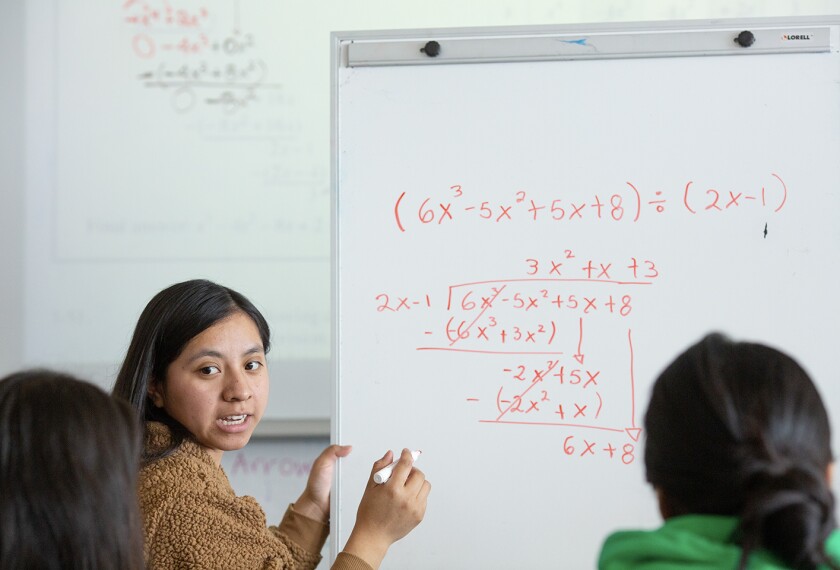Asking a low-performing student to repeat a grade is a big step and one often challenged by students and families. But requiring younger students to take the extra time to master material may boost their reading and math performance as much as five years later.
A new study in the journal finds that students who repeated 3rd grade based on the results of statewide reading tests went on to perform more than 18 percentile points (about half of a standard deviation) higher in both English/language arts and math once they reached 4th grade, compared to peers with similarly low scores. They continued to outperform their peers who had squeaked through to the next grade by more than 7 percentile points in reading and math over the next four years.
About half of states, plus the District of Columbia, allow or require schools to make students repeat 3rd grade if they do not read proficiently by the end of the year. That’s up from 22 states in 2016, even though several states waived grade retention policies during pandemic school disruptions.
“Particularly over the last two to five years, there’s been more interest,” said NaYoung Hwang, an assistant professor of education policy at the University of New Hampshire and lead author of the study. “This is because by 3rd grade, if you’re not able to learn how to read, the student is going to have very negative consequences in the long term.”
Hwang and co-author Cory Koedel, a professor of economics and public policy at the University of Missouri, analyzed the effects of Indiana’s retention policy, in effect from 2011-12 to 2016-17, which required students to meet a reading skills benchmark on the state’s reading test before moving to 4th grade. From 2011-12 to 2016-17, the researchers tracked five years of 3rd graders. The state policy did not require English learners or students with disabilities to be held back, so they were not part of the study.
Less than 2 percent of all Indiana 3rd graders repeated the grade during that time, significantly less than the retention rate in states studied in prior research, which has found retention rates ranging from 3 percent to more than 20 percent. The Hoosier State allows students to retake the reading test and attend intensive summer programs before requiring them to repeat the grade, which Hwang said cuts back on overall retention.
Interpreting retention research
Grade retention policies have shown over the years, with some studies finding students who repeated grades, particularly in , had significantly worse grades, high school graduation rates, and college attainment.
But “the methodology definitely plays a very, very important role” in whether retention shows benefits, Hwang said. Some early studies with negative results compared students who were held back overall to those who weren’t—two groups that already differ in their long-term engagement and achievement.
Hwang’s and Koedel’s study uses what’s known as a regression discontinuity analysis, in which researchers look specifically at the students who scored just under and just over the test cutoff for retention. 69��ý who score within a few points of each other are statistically very similar, and so can provide a truer comparison of the effects of the policy.
Indiana’s retention policy, the study finds, had consistent benefits for the students who were held back, regardless of race, gender, or family income.
While some prior studies have found grade retention can hurt students’ confidence, engagement, and friendship development, the current study did not look at those aspects of social-emotional development. However, students who were held back a year did not show more discipline problems or absenteeism compared to similarly low-performing students who passed to the next grade.
The line of research is ongoing, but Hwang cautioned that the current study only tracks students through 7th grade, and through the 2016-17 school year. So, it does not show any effects on high school—where some earlier studies have suggested retained students are at higher risk of dropping out. The current study also doesn’t show how grade retention may affect students differently at a time when far more students are performing at the lowest levels in reading and math.
A few other recent studies, including statewide policies in Florida and Mississippi as well as district policies in New York City and Chicago, also suggest Some researchers posit that state requirements that retained students receive extra support might have led to the improvements.
Hwang’s study and recent meta-analyses, as well as a separate new grade retention report by the suggest schools can improve their own grade retention policies by:
- Focusing retention on early grades to ensure students master foundational skills.
- Ensure an objective process for identifying students to be retained or attend other types of intensive interventions, to avoid for some groups of students.
- Provide individualized academic and social support for students who repeat a year.
“When students do not reach that [reading] threshold in Indiana, they have another opportunity [to test]. And before that they have supports, like summer literacy camps,” Hwang said. “Concentrating resources on those students who are struggling to learn how to read should definitely feature” in any retention policy.”





